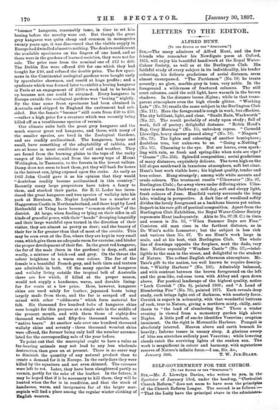LETTERS TO THE EDITOR.
ALFRED HUNT.
[To THE EDITOR OP THE "SPECTATOR."] SIR,—The many admirers of Alfred Hunt, and the few friends who remember his Newdigate poem at Oxford, 1851, will enjoy his beautiful handiwork at the Royal Water- Colour Society, as well as at the Burlington Club. His faithful study of every subject in its individuality, his tender colouring, his delicate gradations of aerial distance, seem almost unsurpassed. "The Parthenon" (No. 18) he treats severely; no glow, marble-grey in tone, very noble. In the foreground a wilderness of fractured columns. The still erect columns, amid the cold light, have warmth in the brown shadows. In the distance looms 2Egina ; while in that trans- parent atmosphere even the high clouds glitter. "Working Late" (No. 16) recalls the same subject in the Burlington Club (No. 111). Here the foreground is rough in work, but effective. The sky brilliant, light, and clear. "Sunlit Rain, Warkworth" (No. 22). The result probably of study upon study ; fall of work, full of poetry; delightful distance. "Robin Hood's Bay, Grey Morning" (No. 15), unbroken repose. " Carnedd Llewellyn, heavy shower passed along" (No. 78). "Niagara (No. 79). The lights and colouring of another hemisphere ;. doubtless true, but unknown to us. "Going a-Nutting " (No. 93). Charming to the eye. But are leaves, even spark- ling with rain, so fresh and spring-like when nuts are ripe F- " Grasse " (No. 256). Splendid composition; aerial gradations of many distances, exquisitely delicate. The town high on the hill slopes southward in luxurious atmosphere, soft but clear. Hunt's best work visible here ; his highest quality, tender and true colour. Hung strangely ; among wide white mounts an& crude colours. The treatment recalls " Ulleswater " (No. 97, Burlington Club) ; far-away views under differing skies. Thies- water is seen from Dockwray ; mid-day, soft and sleepy light, fresh colours of June. Manifold variety surrounds the long lake, winding in perspective. A dark line of woodland softly divides the lovely foreground as a backbone bisects yet unites. Superb in his rare gift of poetical composition. Apart from the Burlington Club Exhibition, the Royal Water-Colour Society represents Hunt inadequately. Akin to No. 97 (B. C.) in tints and season is No. 93, "When Summer Days are Fine."' Coniston old man rises in the farthest distance, as in De What's noble Lancaster ; but the subject is less rich and various than No. 97. To see Hunt's work large in scale, and at his beet, visit Burlington Club. The whole line of drawings opposite the fireplace, next the dado, very fine. Notice especially "Windsor Castle" (No. 57),—intel- ligible to the man in the street, and delightful to the student of Nature. The softest English afternoon atmosphere. Mr. Tate's gift to the nation, too well known to require descrip- tion, "Whitby Harbour" (No. 105). Admirably balanced, and with contrast between the brown foreground on the left and the gem-like, red-rose town with Abbey and open down. above. For poetical landscape of the highest quality, notice. "Loch Cornisk " (No. 8), painted 1869; and "A Land of Slumbering Fire" (No. 76), painted 1871. Each reveals deep study, each brings light out of darkness, with masterly force.. Cornisk is superb in solemnity, with that wonderful buttress of rock, true to Nature, giving a northern misty, chilly, anti- thesis to "the land of slumbering fire." There a winter evening is viewed from a monastery garden high above Naples. A little puff of smoke identifies Vesuvius; eruption imminent. On the right is Mercantile Harbour. Pompeii is absolutely interred. Heaven above and earth beneath lie heavily ; Inferno tosses in uneasy sleep. A glorious sweep of blue sea stretches sullenly past Vesuvius ; while lowering clouds catch the surviving lights of the sunken sun. The work is magnificent in colour and harmony, with mysterious reserve of Nature's infinite force.—I am, Sir, &c.,


















































 Previous page
Previous page